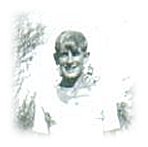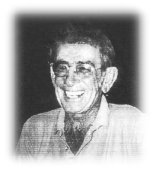Focus On Tardun
Peter O'Neill is one of a small, select group of child migrants who came to Australia before the war. An ex-resident of Clontarf and Tardun, Peter has lived in Queensland since 1951. He reminisces about his experiences as an "Old Boy" with C-BERSS Counsellor Valma Granich.
 Peter O'Neill was 10 when he arrived in Australian in 1939. He lived in Clontarf from 1939 until 1943 when the Royal Australian Airforce took over Clontarf as part of the war effort. The residents were moved to Tardun where Peter stayed until 1948. He was 18 1/2 when he left. Peter O'Neill was 10 when he arrived in Australian in 1939. He lived in Clontarf from 1939 until 1943 when the Royal Australian Airforce took over Clontarf as part of the war effort. The residents were moved to Tardun where Peter stayed until 1948. He was 18 1/2 when he left.
For Peter, the nine years spent in Christian Brothers' institutions (which spanned pre-puberty to young adulthood) are indelibly printed in his memory.
"When we got to Clontarf they still had a lot of building to do.
"I remember laying tiles on our hands and knees in the chapel. They were small wooden criss-crossed ones. We had to match them perfectly. This was done outside school, sometimes in the morning. We carted the bricks for the building itself and the sand and gravel for concrete and cement by hand.
"We loaded the bricks up on our arms. We all got bad lime burns on our feet between the toes from the cement. When the burns became severe, we sat in the square outside the kitchen and dining rooms, bathing our burnt feet in baked enamel dishes containing Condy's crystals."
Whilst his feet were recovering Peter was assigned to "lighter duties" as an altar boy and looking after the turkeys.
He likens his turkey care responsibilities to the role of a shepherd - responsible for supervising his charges on their daily trek around the various buildings and making sure they roosted in the big stone brick barn nightly.
Peter recalls an incident when one of his charges got sick with croup. Being a soft-hearted kid, he placed the ailing turkey in a cardboard box in the hope that the warmth and protection would prompt a speedy recovery.
His good intentions were not so well interpreted by the Brother Superior, who upon finding the turkey, accused Peter of trying to steal it He was given a hiding for his efforts.
At Christmas the turkeys were killed and given to benefactors.
Christmas ... A Sad Time
Peter recalls Christmas as a sad time. He has no memory of receiving presents.
Christmas lunch was a roast meal of some sort. Because the chapel wasn't completed at the time, midnight mass was an open-air affair conducted in the gardens at the front.
Looking back to the young boy who attended those outdoor masses, Peter remembers enjoying the singing and ritual as a welcome relief from the monotony of school and work.
Moving To Tardun
 In 1943, at the age of 13, Peter was one of about 60 boys who were moved from Clontarf to Tardun.
In 1943, at the age of 13, Peter was one of about 60 boys who were moved from Clontarf to Tardun.
The machinery shed was converted into a dormitory for the boys. Living conditions were fairly primitive. In the winter they had to hang tarpaulins from both sides of the shed to keep the rain and cold out. The boys slept on horsehair mattresses.
With only two sets of clothing, there was no need for wardrobe space. The set of clothes not being worn were usually bundled under a pillow. The boys went barefoot both in and out of school. They had a pair of sandshoes that were worn on outings - never frequent enough to really wear them in. Peter remember the shoes pinching tightly every time he put them on.
When the war ended Peter got his first pair of real shoes - army boots that, for him, became work boots.
At Tardun, Peter was again recruited into building projects. He remembers how they used to cart the sand, with two boys to a bag, and each of them ending up with corns on both index fingers. A wheelbarrow with a rope on the end was used to ferry concrete up the scaffolding to lay the flooring.
Making bricks was another ritual. Special moulds were washed, oiled and filled with concrete. When the concrete set, the moulds were pulled apart. The new bricks would then be taken out, stacked or carried up the planks.
Despite the work demands, the boys still found time for recreational activities. They formed a cricket team which completed with other local teams and intra-school football teams grew from scratchy beginnings.
Earning "a few bob"
As he got older, Peter went on several farm stays. One year he seeded a local farmer's crop with a two tonne caterpillar tractor. The money he earned over that 4-5 week period went into his bank account. The following year he sowed the crop for another local farmer and earned himself "another few bob"!
Peter was an enterprising young man. For pocket-money he collected emu beaks and fox scalps which he sold for several quid at a time. He also gathered wool from dead sheep and was paid thirty shillings a corn bag by Wesfarmers. Rabbits too were a good source of income. They could be sold at two schillings a piece. Peter bought a box brownie camera for thirty shillings. The rest of his earnings he set aside to buy a farm.
Sadly, this dream was never realised.
Today...
 Today, Peter is retired and lives in a cottage on a property about 25 kilometres out of Brisbane. This year, he was reunited with his family in England. He is now saving hard for another trip to build on to the relationships with his new-found, extended family. Today, Peter is retired and lives in a cottage on a property about 25 kilometres out of Brisbane. This year, he was reunited with his family in England. He is now saving hard for another trip to build on to the relationships with his new-found, extended family.
(1) Tardun (2) Peter O'Neill (1949) (3) Peter O'Neill (1999)

|



